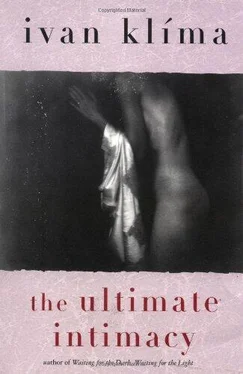Ivan Klima - The Ultimate Intimacy
Здесь есть возможность читать онлайн «Ivan Klima - The Ultimate Intimacy» весь текст электронной книги совершенно бесплатно (целиком полную версию без сокращений). В некоторых случаях можно слушать аудио, скачать через торрент в формате fb2 и присутствует краткое содержание. Год выпуска: 1998, Издательство: Grove Press, Жанр: Современная проза, на английском языке. Описание произведения, (предисловие) а так же отзывы посетителей доступны на портале библиотеки ЛибКат.
- Название:The Ultimate Intimacy
- Автор:
- Издательство:Grove Press
- Жанр:
- Год:1998
- ISBN:нет данных
- Рейтинг книги:3 / 5. Голосов: 1
-
Избранное:Добавить в избранное
- Отзывы:
-
Ваша оценка:
- 60
- 1
- 2
- 3
- 4
- 5
The Ultimate Intimacy: краткое содержание, описание и аннотация
Предлагаем к чтению аннотацию, описание, краткое содержание или предисловие (зависит от того, что написал сам автор книги «The Ultimate Intimacy»). Если вы не нашли необходимую информацию о книге — напишите в комментариях, мы постараемся отыскать её.
The Ultimate Intimacy — читать онлайн бесплатно полную книгу (весь текст) целиком
Ниже представлен текст книги, разбитый по страницам. Система сохранения места последней прочитанной страницы, позволяет с удобством читать онлайн бесплатно книгу «The Ultimate Intimacy», без необходимости каждый раз заново искать на чём Вы остановились. Поставьте закладку, и сможете в любой момент перейти на страницу, на которой закончили чтение.
Интервал:
Закладка:
All the same, Bára was sure she could find a very precise name for her fundamental problem: lack of love.
What if she were to try going to church occasionally, it occurred to her friend at their last meeting. She didn't attend any church, did she?
It had been a long time since Bára had attended church.
Why?
Most of all because she had stopped believing in God, or at any rate
in the one they preached about in church. When she was a little girl she had very much wanted to believe. Even when she was studying she had still tried; in those days to go to church not only meant admitting to one's faith, it was also a sign of opposition to those who forbade belief. And then it struck her that what they preached in churches was too rigid, it hadn't changed for a thousand years. The very symbol of a man or God dying in pain on the cross was an almost perverted emphasis on suffering and death.
On the contrary — her friend explained to her — the cross symbolizes the fact that death has been overcome. Even so, the cross was something like an execution block or the gallows, it would always symbolize for her a cruel and violent ending of life.
Ivana didn't feel well enough versed in theological questions to argue with her. But the minister at the church she attended was an excellent man, both wise and interesting. She always came home from his sermons with a sense of having been cleansed. He was a man of love, she said with unusual fervour. What's more, he had many talents — he sang, played the harmonium, wrote poetry, composed music and could do wood carving. And he had behaved with courage under the old regime; for several years he was banned from preaching at all in Prague. Perhaps he would be able to explain what she found inexplicable.
Bára did indeed attend the church the following Sunday. She didn't make her presence known to Ivana, however, and left during the final hymn. A week later, she did the same. When her friend asked her what she thought about the sermons, Bára replied that she had found them stimulating, but nevertheless she had the feeling she was incapable of believing. What people believed in was simply a dream about God coming down among people in order to conquer death. That was how she saw it anyway. It was a dream purporting to be reality. But death ruled the whole universe, after all. Nothing, no sacrifice, could end its sway.
Ivana thought it was possible that the minister's preaching wasn't up to his usual standard. He was absentminded these days. The first time Bára was there, his mother was dying. Most likely he hadn't got over it quite yet. Ivana also wanted to know why Bára always dashed off before the end.
How could she shake the minister's hand when she wasn't able to believe in what he preached?
But if she were to speak to the minister privately. .
But he was in mourning, after all. She could hardly bother him at this time. Besides she was always in a rush; Sam would take it very hard if she were to neglect him on a Sunday morning. He always wanted her around him.
Did she think she wouldn't come next time then?
Bára said she wasn't sure. She concealed the fact she had already spoken to the minister, that she had given him a lift. She didn't even tell her how he had caught her imagination not only by the urgency with which he preached about the need for love, but also by the tenor of his voice and his gestures, which she suspected concealed some deep sadness or suppressed passion.
5
Daniel had been having disc trouble all that morning. The pain ran from his hip right down to the big toe of his right foot. He had first slipped the disc when he was climbing a rock in the Elbe Sandstone Mountains; he had lost his footing slightly and only realized that something had happened to him the next morning when he found he could not bend to put on his boots. Jitka had helped him to his feet and supported him as they went along in spite of his protests.
It might have been the pain or the weather — a blanket of smog lay over the city more reminiscent of autumn — but he had the impression that everyone he had met that day was either cursing or complaining. First thing that morning Magda had announced to him that she would most likely fail maths because she hadn't the first idea what it was about, 'and nobody,' she added reproachfully, 'is capable of explaining it to me'. Then Masa Soukupová telephoned and wept over her ruined marriage.
He ought to go and lie down. But before he could make up his mind Dr Wagner appeared, ostensibly to borrow some books from the library. It took them only a moment to choose the books, but instead of leaving, his visitor started to complain about society being bogged down in the basest materialism, and how life was dominated by money, brutality and vulgar sex. 'Fewer and fewer people believe in
spiritual values — who has anything to offer now, apart from the church?'
Daniel could have pointed out that even the church was incapable of firing people s imaginations any longer. Only some crazy sect with a new saviour or at least Christ's Delegate at its head was likely to do that. For fanatics like these, people were prepared to give up all their property or even commit mass suicide. Instead, he merely said that the original church had expected Christ's coming and a pitiless judgment on all sinners. And were there so few sinners? But what people have a right to judge them?
Yes, that was his own view entirely, the lawyer agreed, particularly when they themselves were not judges and had simply stolen a list of names and printed them and thought that was enough to prove the guilt of those in question.
'I've been thinking about your father,' and Daniel finally realized the reason for his visit and why he was delaying his departure. 'In your situation I would let the matter rest. You'll never discover the truth after all these years anyway.'
'But there must be some files, some records, preserved still.'
'Not necessarily. And even if there were, what kind of truth do you expect to find in the sort of records they kept?'
'But I'd naturally like to find out something about the circumstances at least.'
'If you say so, Reverend.' In that case, Dr Wagner saw two options. Either to find someone in the Ministry and persuade them to look in the file — if it existed; this would probably not be free of charge. Alternatively, he could try to find some of the scoundrels who interrogated his father and had him on their books.
The idea of bribery was abhorrent to Daniel. And the thought of talking to such individuals even more so. But what he regarded as abhorrent was immaterial at this moment.
Dr Wagner was scarcely out the door when Alois burst into his office, still in his working clothes.
'Has something happened to you?'
'Me? No, not me!' He tried to brush the bits of lime off his overalls on to the carpet. 'But we had an accident at the building site. Fyodor, this young Russian guy, took a header off the scaffolding.'
'Was he killed?'
'No, not outright anyway, but he's in an awful mess.'
'Did you call an ambulance?'
'Of course, but they kicked up a stink about him having no insurance. He was working the way they do nowadays, on the black. A Russian nigger, know what I mean?'
'Which hospital did they take him to?'
'Your one. Where your wife works, I mean.'
'Do you want to phone there?'
Alois shrugged. 'The other fellows said they'll let him stew, seeing he isn't insured and he's a Russian anyway.'
'They wouldn't do that,' although Daniel wasn't entirely sure about this.
'He never spoiled anyone's fun. He didn't know Czech — that's true, apart from the sort of things you'd rather I didn't say here. And a few words he needed for the job. When he'd say words like "beer" or "buddy" it sounded Russian anyway. He said his father was here too, as a soldier.'
Читать дальшеИнтервал:
Закладка:
Похожие книги на «The Ultimate Intimacy»
Представляем Вашему вниманию похожие книги на «The Ultimate Intimacy» списком для выбора. Мы отобрали схожую по названию и смыслу литературу в надежде предоставить читателям больше вариантов отыскать новые, интересные, ещё непрочитанные произведения.
Обсуждение, отзывы о книге «The Ultimate Intimacy» и просто собственные мнения читателей. Оставьте ваши комментарии, напишите, что Вы думаете о произведении, его смысле или главных героях. Укажите что конкретно понравилось, а что нет, и почему Вы так считаете.






![Theresa Cheung - The Dream Dictionary from A to Z [Revised edition] - The Ultimate A–Z to Interpret the Secrets of Your Dreams](/books/692092/theresa-cheung-the-dream-dictionary-from-a-to-z-r-thumb.webp)





